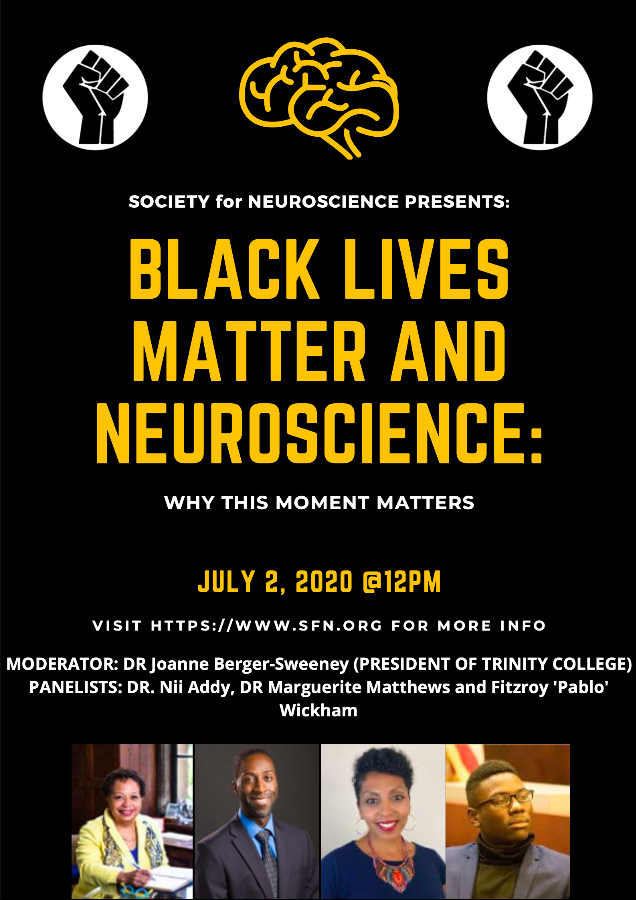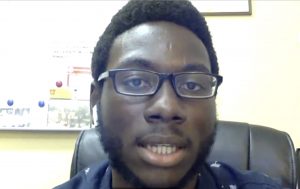Wickham ’21 Speaks on the Black Student Experience in STEM

 As the Black Lives Matter movement continues to shine a light on the Black experience in America, one Wesleyan student is doing his part to foster better understanding for students of color in STEM fields.
As the Black Lives Matter movement continues to shine a light on the Black experience in America, one Wesleyan student is doing his part to foster better understanding for students of color in STEM fields.
On July 2, Fitzroy “Pablo” Wickham ’21 participated in a panel discussion on “Black Lives Matter and Neuroscience: Why This Moment Matters.” The event, hosted by the Society for Neuroscience and moderated by Trinity College President Joanne Berger-Sweeney, provided a forum to discuss hurdles faced by Black students and faculty in STEM and ways to enhance recruitment, mentoring, and retention in STEM fields.
Wickham, a neuroscience and theater double major, is the Class of 2021 president and a College of Integrative Sciences summer research student. A native of Jamaica, Wickham prefaced his comments by acknowledging that as a West Indian Black man, his experience does not necessarily reflect the full breadth of experiences had by African American students in science. But for his part, Wickham hopes that in sharing his perspective as a neuroscience undergraduate, he can help move the conversation forward in terms of “how we can make the field more inclusive and equitable” and in particular to voice some of the challenges Black students encounter when navigating STEM.
Although the panel was convened to discuss issues faced by Black students and faculty in the field of neuroscience, the topics addressed stretched beyond scientific disciplines, touching on issues that affect people of color in all aspects of academia, including lack of representation, the misperception that rewards are dispensed based on race rather than merit, and questions of tokenism. Over the course of the hourlong panel, participants talked about their own experiences, the obstacles they themselves had faced in their varied career paths, and the individuals who had helped to mentor them and advocate for them along the way.
Nii Addy, associate professor of psychiatry at Yale’s School of Medicine, encouraged participants to look outside their individual departments for mentorship and support when there are few available options in their own field and said that he, himself, makes mentoring others and connecting individuals with potential mentors a priority.
Marguerite Matthews, a health program specialist in the Office of Programs to Enhance Neuroscience Workforce Diversity at the National Institute of Neurological Disorders and Stroke (NINDS), works on diversity initiatives and programs that provide research training and career development opportunities for students from underrepresented backgrounds. She emphasized the need for academia to work “in tandem” with government programs to make sure underrepresented students and faculty are getting the necessary support to create an equitable situation with their peers, citing the importance of “seeing diversity as something that is not an add-on. It is not an extra, not a bonus, not something special that you are doing. It is something that should be considered through every single process.”

When asked about signs of progress and change, Wickham noted Wesleyan’s public support of the Black Lives Matter movement and encouraged the University to continue moving forward by supporting Black businesses and by setting a new standard for action among peer institutions.
Although the panel didn’t necessarily have solutions for every issue brought up during the discussion and Q&A, Wickham did find the overall discussion itself to be a powerful first step.
“This conversation is so important to so many people. I was overwhelmed by the number of registrants for the webinar—both in America and internationally,” he said. “The BLM movement has the undivided attention of the world right now and people are listening. These discussions are needed! The many questions posed by the attendees were very thought-provoking and show that we need more opportunities like this to hash out the matter and figure out how we will move forward, because one hour is not enough.”

